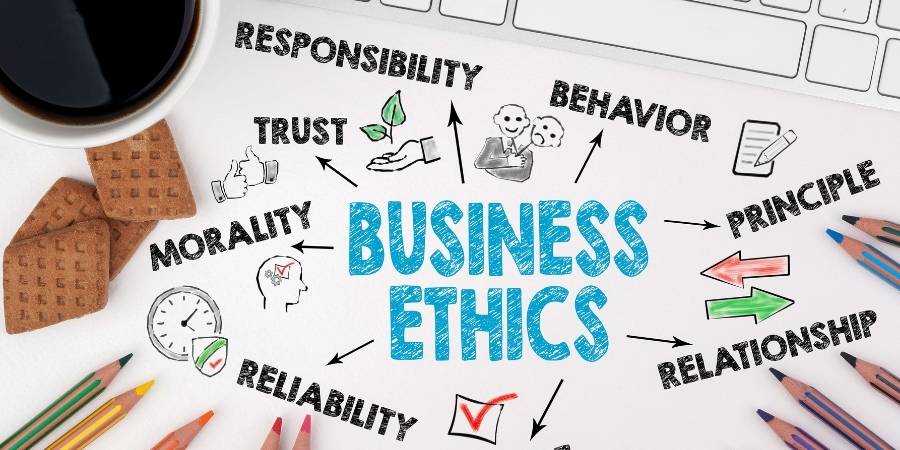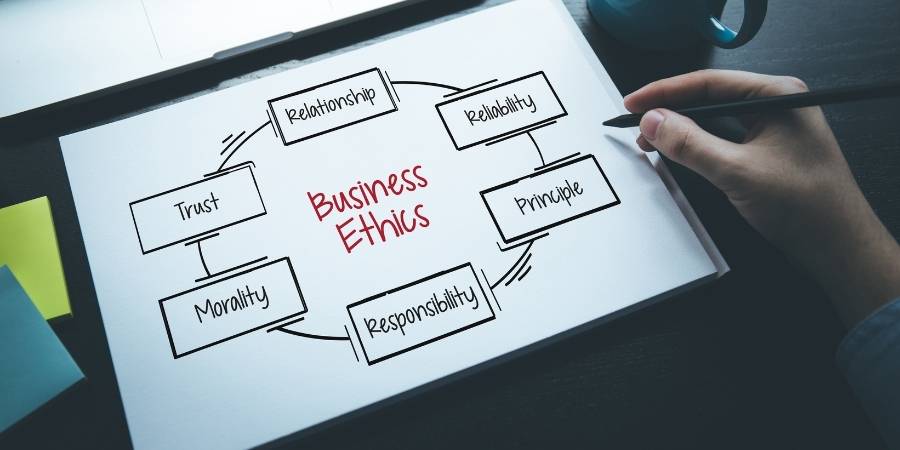Business ethics defines what is wrong and right in a business. It improves the law by highlighting what behaviors are acceptable and can be controlled by the government. Big businesses create business ethics to enhance integrity among their workers and enable key shareholders and customers to trust them. Corporate business ethics have become the norm in many ventures, but the quality of ethics varies in different establishments.

Business Ethics: Determining Right and Wrong
To act ethically is to determine what is wrong and right. Most organizations and settings worldwide have standards that dictate how people carry themselves. Most businesses can determine what is unethical. For example, it is wrong if employees work in unsafe business environments. It can be a crowded work floor with few exits, and if a risk such as a fire occurs, it may be difficult for everyone to get out.
Some business practices are unethical but still occur in some companies. Ethical practices may be difficult to scrutinize if they exist in a grey area. It is because the practices may be unethical, but they are correct.
For instance, if a company, ABC, wants to purchase material from another firm XYZ, it will not buy the material as a company ABC; instead, it will hire one of its staff to go and purchase the material from the company XYZ so that it can get the best deal. This practice may be considered unethical, but it is right.
Business Ethics Explained In Three Parts
To disintegrate business ethics, you must understand the primary components of that term. The three basic concepts include:
1. History
The first organizations and companies worldwide established business ethics in the 1900s. Business ethics was first used in the US; the basic principles were based on academic writings and academies about business operations. Basic business ethics are derived from practical study and research about business functions and operations.
2. Scandals
Scandals usually occur in various organizations if managers steal funds and products. Other scandals include child labor and poor working conditions. These practices led to the establishment of business ethics.
3. Integration
Integration is the most significant aspect of business ethics. Its development means that most businesses have embraced ethical practices. They have made business ethics a primary part of their operations. As the world becomes more politically upright, most businesses are forced to follow established guidelines and principles.

Types Of Business Ethics
There are several types of business ethics; the most common include:
Corporate social responsibility
It means meeting the needs of stakeholders and ensuring the right procedures are followed so as not to harm the operation’s employees, the community, and the environment. The goal of businesses is to make profits, but they must follow the right procedures to achieve their goals. Studies suggest that companies that follow ethical practices and have good corporate governance perform well financially.
Trustworthiness and transparency
Companies must ensure transparency while reporting their financial performance. Firms should publish reports of how they made decisions and what factors affected their performance. They should publish both good and bad news to showcase the situation to investors and customers.
Ethics and technological practices
Today, technology is incorporated into most things, so companies should ensure they use technology ethically. A company should also ensure the technology it uses is secure; the data of its employees and customer data should be kept well protected.
Fairness
A workplace should be diverse, fair, and inclusive; they should not discriminate against different races, ages, identities, and religions. A fair workplace promotes growth and success for everyone.

How to Implement Business Ethics
Implementation of good business ethics can start at the top. Companies should establish codes of conduct and have guiding principles, training programs, and reporting procedures to enforce business ethics. If the company implements ethical behaviors, it will help if it fosters continuous communication with various staff to ensure they uphold good conduct.
Final Word
Business ethics is the responsibility of the top management, lower staff, customers, stakeholders, and shareholders. Therefore, businesses should establish ethical practices and models that prioritize the company’s interests and the welfare of those it serves. Upholding business ethics creates a positive workplace, builds trust with business partners and customers, and increases profits and revenues.









